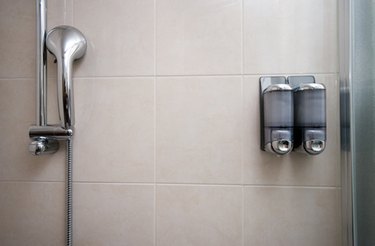Things You'll Need
Single edge razor blades
Blade holder
2-inch thin blade putty knife
Rubbing alcohol
Rags

Silicone caulking is used in showers to seal the gaps in each corner where two tiled walls come together, between the bathtub and the base of the tiled wall, and to seal the shower door frame. It is used to keep water from entering behind the tile and rotting the wall that it is attached to and to keep water from leaking out of the shower door frame. Silicone caulking is a rubberized sealant that does not harden over time, but not all silicone caulking is made for showers, which results in the promotion of mold growth and mildew. The only way to get rid of this problem is to remove the caulking.
Step 1
Insert a single edge blade into a blade holder. A blade holder will keep your hands and fingers a safe distance away from the sharp edge.
Video of the Day
Step 2
Cut along the top and bottom edge of the entire line of caulking with a straight edge razor blade. You can do this by holding the razor blade at a sharp angle to the wall or edge of the bathtub, and pushing the blade towards the line of caulking. Lifting the edges will help you to get the blade and a putty knife under the line of caulking.
Step 3
Hold the 2-inch putty knife at a 45-degree angle and push against a lifted edge at the top or bottom of the caulking line. It does not matter which end you start at. The blade of the putty knife will slide under the line of caulking. Lift up on the putty knife to raise the line of caulking so that you can take hold of it with your hand.
Step 4
Pull slowly on the line of caulking with your hand, and use the putty knife to keep pushing underneath the caulking. You are essentially pulling and pushing the line of caulking off at the same time. Repeat each step until you have removed all of the silicone caulking. Carefully scrape off remnants of silicone with the straight edge blade.
Step 5
Moisten a rag with rubbing alcohol and wipe down all the areas that you removed caulking from. The alcohol will clean and prepare the surfaces for a new application of caulking.
Tip
Clean out mold and mildew and allow the area to completely dry before caulking again.
Video of the Day